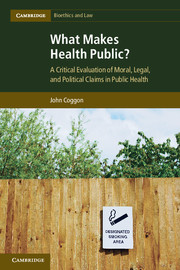 What Makes Health Public?
What Makes Health Public? Foreword
Published online by Cambridge University Press: 05 June 2012
Summary
John Coggon, in this seminal book, asks a question of such simplicity, but also of such profound importance: What makes health public? The rigor with which he examines this critical question will make this book a classic in the field of public health ethics – an essential reference point for scholars, students, and policy-makers. Coggon’s essential claim is that any normative analysis in the field of public health, or argument in favor of, or against, a particular public health measure, is based in political theory. This remains true whether the proponent favors a limited model of public health (with a narrow public sphere) or an expansive model. In both cases, Coggon treats these as political questions, exposing the political nature of public health claims.
What I wish to do in this foreword is to demonstrate why Coggon’s question is so significant in contemporary academic and public discourse. In short, understanding the public/private dimensions of health is indispensible for ascertaining the appropriate scope of governmental public health in a liberal democracy. And that issue, as Coggon points out, is as socially and politically charged, as it is important to the population’s wellbeing.
- Type
- Chapter
- Information
- What Makes Health Public?A Critical Evaluation of Moral, Legal, and Political Claims in Public Health, pp. xi - xviPublisher: Cambridge University PressPrint publication year: 2012


